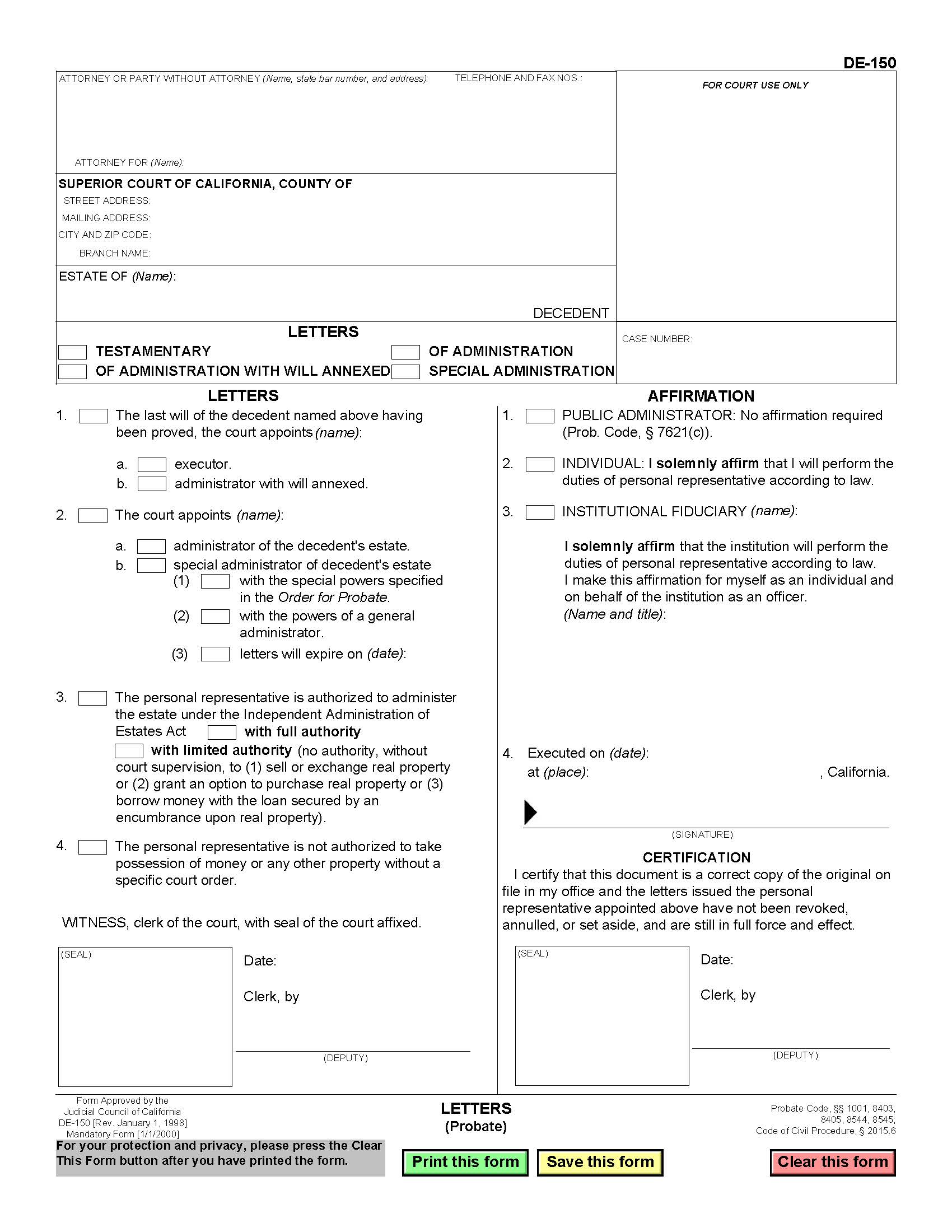Dealing with the legal aspects of estate administration following the loss of a loved one can be a challenging endeavor. A critical document that often comes into play during this process is the letter of testamentary. This document, which is often misunderstood, is a crucial tool for accessing the deceased’s assets and ensuring their final wishes are fulfilled. Let’s delve into the intricacies of this vital legal document and its role in estate planning.
Decoding the Role of a Letter of Testamentary
When an individual passes away, their estate must undergo the probate process to distribute their assets and settle any remaining debts. A key document often required during this process is the Letter of Testamentary. This legal document, issued by the court, empowers the executor of the estate to act on behalf of the deceased person.
So, what exactly does a Letter of Testamentary do? Here are some primary reasons why this document is indispensable in the probate process:
- It formally designates the executor of the estate and grants them the legal power to manage and distribute the assets as per the deceased person’s wishes.
- It serves as evidence to banks, government agencies, and other entities that the executor has the authority to act on behalf of the estate.
- It aids in preventing disputes and challenges from heirs or creditors by affirming the executor’s legal authority.
In essence, a Letter of Testamentary is pivotal in the probate process, providing the executor with the necessary authority to fulfill their responsibilities and ensure the deceased person’s assets are distributed correctly.
Essential Elements of a Letter of Testamentary
When creating a letter of testamentary, it’s crucial to incorporate key elements that are vital for the legal process. These elements help confirm the authenticity and validity of the document, ensuring that the executor has the authority to act on behalf of the deceased’s estate. Here are some essential elements that should be included in a letter of testamentary:
- Executor Information: The letter should explicitly state the name and contact details of the executor appointed to administer the estate.
- Decedent Information: It’s crucial to provide information about the deceased person, including their full name, date of death, and last known address.
- Court Information: The letter should mention the court where the probate process is taking place, including the case number and the date the letter was issued.
Furthermore, the letter should be signed by a judge or court official, validating the executor’s authority to fulfill their duties. These essential elements ensure that the letter of testamentary is legally binding and can be used to manage the deceased’s estate in accordance with their wishes.
Significance of Acquiring a Letter of Testamentary
Securing a Letter of Testamentary can be a vital step in the probate process when handling the estate of a deceased person. This legal document grants the executor the authority to act on behalf of the deceased and manage their estate according to their wishes.
With a Letter of Testamentary in possession, the executor can undertake important tasks such as:
- Distributing assets to beneficiaries
- Settling debts and taxes
- Addressing legal matters related to the estate
Possessing a Letter of Testamentary also safeguards the executor, as it serves as evidence of their authority to act on behalf of the estate. This can help prevent disputes and ensure that the estate is managed in a smooth and efficient manner.
Guiding Through the Process of Acquiring a Letter of Testamentary
When it comes to acquiring a Letter of Testamentary, there are several key steps you will need to follow to navigate the process smoothly. This legal document grants you the authority to handle the affairs of someone who has passed away, ensuring their assets are distributed according to their wishes.
Here are some crucial steps to consider:
- Educate Yourself: Understand what a Letter of Testamentary is and how it can impact the estate of the deceased.
- Contact the Court: Reach out to the probate court in the jurisdiction where the deceased resided to initiate the application process.
- Collect Documentation: You will need to provide certain documents, such as the deceased’s will, death certificate, and identification, to support your request for a Letter of Testamentary.
By following these steps and seeking advice from legal professionals if needed, you can navigate the process of obtaining a Letter of Testamentary with confidence.
Wrapping Up
In conclusion, obtaining a letter of testamentary is a significant milestone in the process of settling an estate and ensuring the final wishes of a loved one are fulfilled. This official document empowers the executor to manage the deceased’s assets and distribute them according to their will. With this responsibility also comes great care and attention to detail, as the executor navigates the complexities of probate and estate administration. By understanding the importance and implications of a letter of testamentary, individuals can better prepare for the process ahead and honor the legacy of those who have passed on.

Unlocking the Mystery: What is a Letter of Testamentary?
Introduction
When a loved one passes away, their estate typically goes through a legal process called probate. During probate, the court validates the deceased’s will and ensures that their assets are distributed according to their wishes. One essential document that plays a significant role in this process is the Letter of Testamentary.
What is a Letter of Testamentary?
A Letter of Testamentary, also known as Letters Testamentary, is a legal document issued by the probate court that authorizes the executor named in a will to administer the estate of a deceased individual. This document grants the executor the legal authority to carry out the instructions outlined in the will, such as distributing assets to beneficiaries, settling debts, and handling any other matters related to the estate.
Importance of a Letter of Testamentary
Having a Letter of Testamentary is crucial for the executor to perform their duties effectively. Without this document, the executor has no legal standing to act on behalf of the estate, which can lead to delays and complications in the probate process. With a Letter of Testamentary in hand, the executor can confidently navigate the complexities of estate administration and fulfill their fiduciary responsibility to the beneficiaries.
How Does it Work?
Once the probate court approves the will and appoints the executor, the court issues the Letter of Testamentary to the executor. This document serves as proof of the executor’s authority to act on behalf of the estate. The executor can then use the Letter of Testamentary to access the deceased’s assets, settle debts, file taxes, and distribute the estate’s assets according to the will’s instructions.
Benefits and Practical Tips
- Streamlines the probate process
- Provides legal authority to the executor
- Ensures assets are distributed according to the deceased’s wishes
- Reduces the risk of disputes among beneficiaries
Practical Tips for Obtaining a Letter of Testamentary
- Consult with an experienced estate planning attorney
- Gather all necessary documents, including the deceased’s will
- Submit the required paperwork to the probate court promptly
- Follow the court’s instructions and deadlines diligently
Case Studies
Here are some real-life scenarios where a Letter of Testamentary played a crucial role in estate administration:
Case Study 1
| Scenario | Outcome |
|---|---|
| Executor failed to obtain a Letter of Testamentary | Probate process delayed, assets tied up in court |
Case Study 2
| Scenario | Outcome |
|---|---|
| Executor presented a valid Letter of Testamentary | Smooth probate process, assets distributed efficiently |
First-hand Experience
As an executor of my late father’s estate, obtaining a Letter of Testamentary was a crucial step in fulfilling my duties responsibly. With the legal authority granted by the court, I was able to navigate the complexities of probate with confidence and ensure that my father’s wishes were honored.


